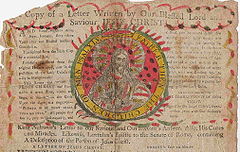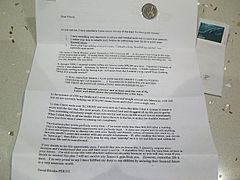- Chain letter
-
A typical chain letter consists of a message that attempts to the recipient to make a number of copies of the letter and then pass them on to as many recipients as possible. Common methods used in chain letters include emotionally manipulative stories, get-rich-quick pyramid schemes, and the exploitation of superstition to threaten the recipient with bad luck or even physical violence or death if he or she "breaks the chain" and refuses to adhere to the conditions set out in the letter. Chain letters started as actual letters that one received in the mail. Today, chain letters are generally no longer actual letters. They are sent through email messages, postings on social network sites, and text messages.
There are two main types of chain letters:
- Hoaxes - Hoaxes attempt to trick or defraud users. A hoax could be malicious, instructing users to delete a file necessary to the operating system by claiming it is a virus. It could also be a scam that convinces users to send money or personal information. Phishing attacks could fall into this.
- Urban legends - Urban legends are designed to be redistributed and usually warn users of a threat or claim to be notifying them of important or urgent information. Another common form are the emails that promise users monetary rewards for forwarding the message or suggest that they are signing something that will be submitted to a particular group. Urban legends usually have no negative effect aside from wasted bandwidth and time.
In the United States, chain letters that request money or other items of value and promise a substantial return to the participants (such as the infamous Make Money Fast scheme) are considered a form of gambling and therefore illegal.[1] Other types of chain letters are viewed as a general nuisance in that frequently multiplying letters clog up the postal system and do not function as correspondence mail, but rather, a game. Some colleges and military bases have passed regulations stating that in the private mail of college students and military personnel, respectively, chain letters are not authorized and will be thrown out. However, it is often difficult to distinguish chain letters from genuine correspondence.
Contents
Channels
Print
The oldest known channel for chain letters is written, or printed, on letters on paper. These might be exchanged hand-to-hand or distributed through the mail. One notorious early example was the "Prosperity Club" or "Send-a-Dime" letter. This letter started in Denver, Colorado in 1935, based on an earlier luck letter. It soon swamped the Denver post office with hundreds of thousands of letters before spilling into St. Louis and other cities.[2]
In Africa, most chain letters take religious perspectives especially relating to Christianity and Islam.[citation needed] Often these letters originate from Photocopy centers, claiming to have originated from the Pope, with the intent of persuading people to make copies of such letters. The content usually gives one or two examples of people, sometimes public figures who obeyed and were rewarded and others who disobeyed and suffered heavily, which may even include cases of deaths and of someone becoming a millionaire overnight.[citation needed] These types of letters will flourish for some days and will die out naturally, partly based on the economic realities of the people, and maybe many would also reason that if that was truly the original letter, then it cannot contain cases of people who had broken or continued the chain.
Email
Some email messages may seem fairly harmless, for example, a grammar school student wishing to see how many people can receive his email for a science project, but can grow exponentially and be hard to stop. Messages sometimes include phony promises from companies or wealthy individuals (such as Bill Gates) promising a monetary reward to everyone who receives the message.[3] They may also be politically motivated, such as "Save the Scouts, forward this to as many friends as possible"[4] or a concept that a popular TV or radio show may be forced off the air.[5] Some, like the "Hawaiian Good Luck Totem" which has spread in thousands of forms, threaten users with bad luck if not forwarded.[6] There are many forms of chain email that threaten death or the taking of one's soul by telling tales of other's deaths, such as the Katu Lata Kulu chain email, stating that if it is not forwarded, the receivers of the message will be killed by the spirit. Another involved an email involving a homicidal Mickey Mouse, who will intrude the recipient's domain to kill him or her unless sent to the number of recipients (25). Any lower they will suffer death, injury, paranoia, and bad luck.
Platforms like Facebook, YouTube and Myspace can host chain letters playing with users' emotions. They may also be in the form of a warning, such as stories of escaped convicts et cetera which urge the reader to pass the message on. One chain letter distributed on MSN Hotmail began, "Hey it's Tara and John the directors of MSN"... and tells you that your account will be deleted if you don't send that message to everyone.[7]
Another common form of email chain letter is the virus hoax.
Chain spiders
A chain spider is a type of electronic chain letter whereby recipients are encouraged to sign a petition in favor of a particular cause with the list of names contained within the message. This is called a chain spider because each time it is forwarded to a group of people each recipient receives an independent clone of the message such that numerous copies will exist with signatures being added to only one copy. For example if Fred started a chain spider and sent it initially to Katie and Andrew, who in turn signed it, Katie and Andrew would then have different lists to send on with Andrew's friends never being added to Katie's list and vice versa. Chain spiders propagate in an exponential fashion, and thus chains with long recipient lists are likely to have either spread to a lot of people, or contain fabricated information (see Pyramid scheme).
Web communities
Chain letters have become wide spread on Myspace (in the form of myspace bulletins) and YouTube (in the form of video comments) as well as on Facebook through messages or applications. For instance, the chain post/email of "Carmen Winstead",[8] a girl who was pushed down a sewage drain in a firedrill, states that, "if you do not repost/send this to 10 people, Carmen will find you and kill you." Chain letters are often coupled with intimidating hoaxes or the promise of providing the sender with "secret" information once they've forwarded the message.
Legality
Chain letters may also qualify under other types of illegal activities, as in the case of a pyramid scheme asking recipients to send money and forward the email. They may be harmful, and contain trojans.
In the United States it is illegal to mail chain letters that involve pyramid schemes or other such financial inducements under Title 18, United States Code, Section 1302, the Postal Lottery Statute, though chain letters that ask for items of minor value such as business cards or recipes are not covered by this law. If pyramid scheme chain letters are sent through email, this constitutes wire fraud.
See also
- Gratis Internet
- Mail fraud
- Make money fast
- Mon cher Mustapha letter – a chain letter used as a form of black propaganda
- Multi-level marketing
- Spam
- Virus hoax
- Wire fraud
Similar distribution
- Faxlore – distribution of chain-letters or similar material by fax machine
References
- ^ The U.S. Postal Inspection Service cites 18 USC 1302 when it asserts the illegality of chain letters:
Chain letters are illegal if they request money or other items of value and promise a substantial return to the participants. Chain letters are a form of gambling, and sending them through the mail (or delivering them in person or by computer, but mailing money to participate) violates Title 18, United States Code, Section 1302, the Postal Lottery Statute.] - ^ VanArsdale, Daniel W. (1998, 2002). "Chain Letter Evolution". http://www.silcom.com/~barnowl/chain-letter/evolution.html. Retrieved 2006-08-21.
- ^ Mikkelson, Barbara; David Mikkelson. "Thousand Dollar Bill". Urban Legends Reference Pages. http://www.snopes.com/inboxer/nothing/billgate.asp. Retrieved 2008-03-24.
- ^ Mikkelson, Barbara; David Mikkelson. "A Boy Scout Outing". Urban Legends Reference Pages. http://www.snopes.com/inboxer/petition/boyscout.asp. Retrieved 2008-08-06.
- ^ Mikkelson, Barbara; David Mikkelson. "Petition to Ban Religious Broadcasting". Urban Legends Reference Pages. http://www.snopes.com/politics/religion/fcc.asp. Retrieved 2008-08-06.
- ^ Newton, Michael (2004). The encyclopedia of high-tech crime and crime-fighting. pp.144.
- ^ "Thousands fall for hotmail prank". BBC News. 8 March 2006. http://news.bbc.co.uk/2/hi/business/4778046.stm. Retrieved 2008-05-27.
- ^ http://www.snopes.com/horrors/ghosts/winstead.asp
Bibliography
- Dan Squier. The Truth About Chain Letters, 1990, Premier Publishers, ISBN 0915665212
- Athena Dean. All That Glitters is Not Gold: Breaking Free From the Sweet Deceit of MLM, 1998, Winepress Publishing, ISBN 1579211348
- James Walsh. You Can't Cheat An Honest Man: How Ponzi Schemes & Pyramid Frauds Work, Merritt Publishing, ISBN 1563431696
- Gary Tartaglia. Shattered Dreams: How To Avoid Costly Mistakes In Multi-level Marketing, 1985, Targeted Communications, ISBN 0961440406
- Stephen Butterfield. Amway: The Cult of Free Enterprise, 1985, South End Press, ISBN 0896082539
- John Scarne. Complete Guide to Gambling, Fully Revised, Expanded, Updated edition. Fireside, 1986, ISBN 0671630636
External links
- Chain Letters at the Open Directory Project
- Chain Letter Evolution, Daniel W. VanArsdale. A historical analysis, including an archive of actual letters.
- What's wrong with chain letters?
- A discussion of the history and various types of chain letters (from Snopes.com)
- Break the chain
- An example of a "Send-a-dime" letter
Wikimedia Foundation. 2010.


